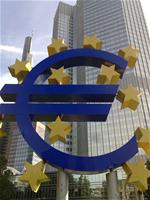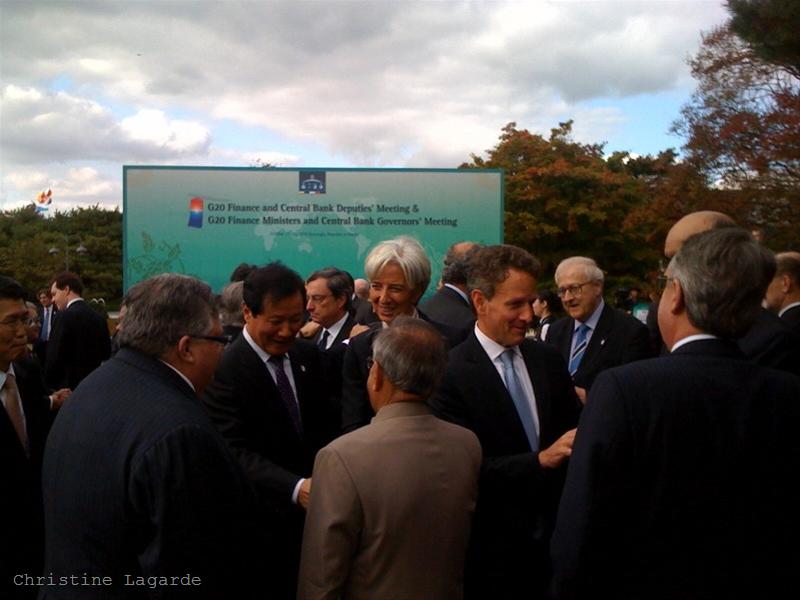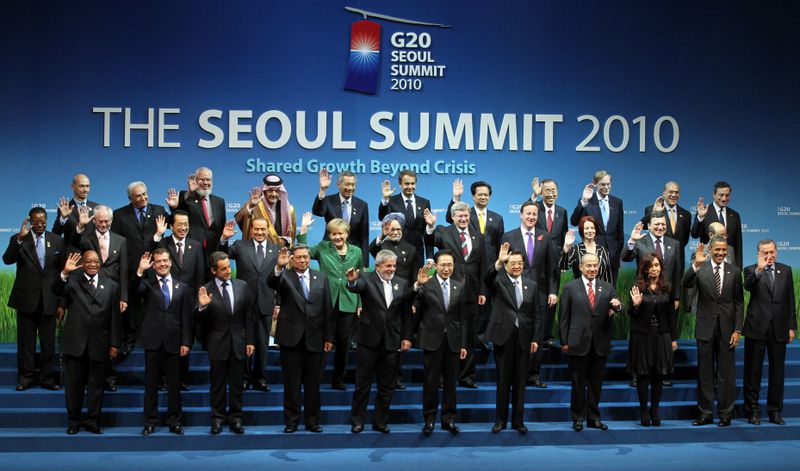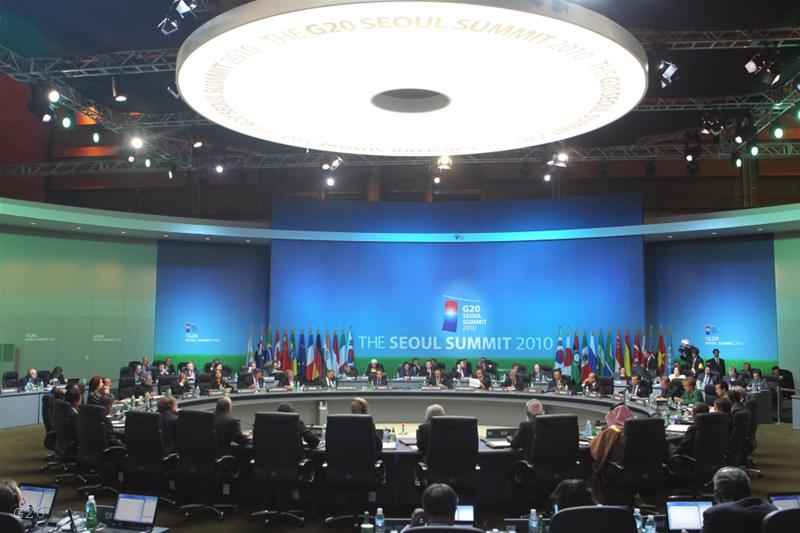The biggest loser from the currency wars is the eurozone
Adelina Marini, October 20, 2010
 The more one goes in depth into the genesis of the global currency conflict, the more it becomes clear that the main culprit is the US, accompanied by the UK. The chief economist of the pro-European think-tank Centre for European Reform (based in London) and the liberal Carnegie Endowment for International Peace have reached to the same conclusion, independently from each other. Although Simon Tilford from CER is more focused on the euro area, he also shares the opinion that the reasons for the current conflict lay in the monetary policy the Federal Reserve and Bank of England lead.
The more one goes in depth into the genesis of the global currency conflict, the more it becomes clear that the main culprit is the US, accompanied by the UK. The chief economist of the pro-European think-tank Centre for European Reform (based in London) and the liberal Carnegie Endowment for International Peace have reached to the same conclusion, independently from each other. Although Simon Tilford from CER is more focused on the euro area, he also shares the opinion that the reasons for the current conflict lay in the monetary policy the Federal Reserve and Bank of England lead.
According to Uri Dadush and Vera Eidelman from Carnegie, the US has always been on shaky ground when arguing for rebalancing of world economy. "Here was the country responsible for the greatest consumption and construction binge in history declaring that things must change; that other countries should mend their ways, relying less on lending to the United States and more on their own spending; that U.S. exports would double in five years, and that the rest of the world’s currencies must appreciate to help out", the two economists write.
Their research shows another very important fact when studying the currency wars. The yen in Japan and the yuan in China have appreciated substantially - 34 percent and 10 percent, respectively - from their 2006–2007 averages. The euro has changed little from pre-crisis levels, despite its weakness since the outbreak of the sovereign debt crisis. Even a more important fact, Dadush and Eidelman write, is that the dollar has depreciated slightly. Of the 40 largest economies, 25 have seen their currencies depreciate in nominal effective terms from pre-crisis levels. These include several countries that have vocalized the need to curb supposed appreciation, such as South Korea and India.
Only seven countries (including Japan and China) have seen their currencies appreciate by more than 10 percent since the start of the Great Recession. Of these, four countries - Japan, Switzerland, Israel, and China have a significant current account surplus. In the other three countries - Brazil, Colombia, and the Czech Republic - currency appreciation may be more problematic. Each of these countries has a modest current account deficit, and their real effective exchange rates have appreciated by 42 percent, 27 percent, and 36 percent.
Another element is also important: improved macro fundamentals, better governance, booming commodity exports, and recent oil and gas finds have made Brazil and Colombia more attractive to foreign investors, and the Czech Republic has been one of the more successful transition and EU-accession countries. Nevertheless, Uri Dadush and Vera Eidelman write, it is unclear whether the large capital inflows into these countries will be sustained .
According to Carnegie, currency peace could be achieved through the following steps:
- the focus of the G20, the IMF, and individual ministries of finance should shift away from rebalancing to stimulating domestic demand in individual countries in a sustainable way;
- advanced countries should beware of more quantitative easing to stimulate demand (never mind to engineer devaluation).
It is the quantitative easing one of the main problems, according to Simon Tilford with the Centre for European Reform. He is almost certain that the Federal Reserve and Bank of England would embark on a further round of so-called quantitative easing before the end of 2010. Both central banks are considering such action because of the failure of their respective economic recoveries to gain traction and their consequent fears that inflation will fall too low. Weak economic growth and low inflation (or worse, deflation) is very dangerous for highly indebted economies, because it makes it much harder to reduce the real value of their debt, the economist explains.
The biggest loser is the eurozone
The Economic and Monetary Union appears to be the biggest loser, according to  the analyses of the two think-tanks. Simon Tilford thinks that the reason is in the European Central Bank's position for a tougher monetary policy, refraining from providing unlimited liquidity to the euro area banks with the result that market interest rates have risen sharply. Besides the ECB refrains from intervening on the foreign money markets. Furthermore, the central bank of the EU believes the potential inflationary risks of quantitative easing outweigh the threat of deflation.
the analyses of the two think-tanks. Simon Tilford thinks that the reason is in the European Central Bank's position for a tougher monetary policy, refraining from providing unlimited liquidity to the euro area banks with the result that market interest rates have risen sharply. Besides the ECB refrains from intervening on the foreign money markets. Furthermore, the central bank of the EU believes the potential inflationary risks of quantitative easing outweigh the threat of deflation.
"The problem for the eurozone is that unorthodox monetary policy such as quantitative easing tends to depress the currencies of the countries whose central banks are engaged in it. The reason is that some of the money issued flows abroad. The weakness of the dollar (and the pound) has led many to question whether the US and UK are engaging in competitive currency devaluations. In short, they stand accused of attempting to bolster their trade competitiveness at others' expense", Simon Tilford explains.
He also shares the opinion that global imbalances are one of the main reasons for the financial crisis, because they have led to excessive capital flows to the US and other fast-growing developed economies. These pushed down the cost of capital and encouraged – together with poor management – excess leverage and risk-taking. "US attempts to cajole the Chinese and others to pursue more balanced economic growth have largely fallen on deaf ears. By pumping out lots of dollars, the US central bank hopes to make it more costly for countries to hold down their currencies".
In the meantime, the euro is set to remain very strong. This is bad news for the stability of the eurozone. If it persists, the adjustment facing struggling members of the currency union, such as Spain, will be even harder to bring off. Spain requires strong growth in exports to offset the weakness of its domestic economy, and a strong euro will make its goods and services less competitive in export markets outside the currency bloc.
The advice Centre for European Reform's chief economists gives is the ECB to hold off tightening monetary policy, as this would further increase the attractiveness of the euro relative to the dollar. Besides, barriers to stronger domestic demand across the eurozone should be removed. Again he reaffirms his position that export is not the motor that would help exit the crisis because the signs of a pick-up in German domestic demand are positive in this regard, but it remains to be seen how vulnerable this is to a weakening of external demand for German goods.
 Uri Dadush and Vera Eidelman also point out that in the eurozone Germany and the rest of the key members should stimulate domestic demand in order to support adjustments in the European periphery, suppressed by debts. A possible failure to support adjustments of competitiveness and fiscal balances in the periphery one day might threaten the very survival of the euro area.
Uri Dadush and Vera Eidelman also point out that in the eurozone Germany and the rest of the key members should stimulate domestic demand in order to support adjustments in the European periphery, suppressed by debts. A possible failure to support adjustments of competitiveness and fiscal balances in the periphery one day might threaten the very survival of the euro area.
China is not the culprit
Against the backdrop of the vigorous attacks against China, Carnegie underlines that in fact China is the only country that has contributed to global rebalancing. Its domestic demand has increased by 41 percent since 2006–2007, its current account surplus has declined by 5 percent of GDP. Simon Tilford does not support that decisively China but he points out that the Chinese are not the only ones that have remained deaf for the US calls for rebalancing of global economy. He says that the German government was instrumental in preventing any discussion of imbalances within the G20, joining the Chinese in arguing that it is for the deficit countries alone to put their houses in order.
In fact, no matter who is right and who is wrong in the currency dispute, the fact is that any unilateral actions, although they might bear some short-term political (predominantly) dividends, they harm economic recovery in the entire world, because the interconnectedness of global economy has reached already the point of no return. So, with each action or inaction every global player could harm the rest, including itself.
 Angela Merkel, Emmanuel Macron | © Council of the EU
Angela Merkel, Emmanuel Macron | © Council of the EU Benoit Coeure | © Council of the EU
Benoit Coeure | © Council of the EU Pierre Moscovici | © Council of the EU
Pierre Moscovici | © Council of the EU | © Christine Lagarde
| © Christine Lagarde | © G20
| © G20 | © G20
| © G20